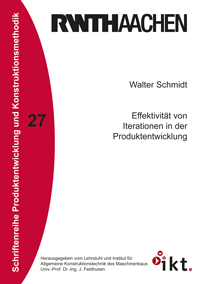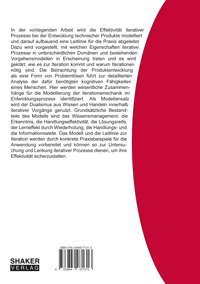
Shop : Details
Shop
Details
45,80 €ISBN 978-3-8440-7131-3Softcover128 pages49 figures178 g21 x 14,8 cmGermanThesis
January 2020
Walter Schmidt
Effektivität von Iterationen in der Produktentwicklung
In der vorliegenden Arbeit wird die Effektivität iterativer Prozesse bei der Entwicklung technischer Produkte modelliert und darauf aufbauend eine Leitlinie für die Praxis abgeleitet. Dazu wird vorgestellt, mit welchen Eigenschaften iterative Prozesse in unterschiedlichen Domänen und bestehenden Vorgehensmodellen in Erscheinung treten und es wird geklärt, wie es zur Iteration kommt und warum Iterationen nötig sind. Die Betrachtung der Produktentwicklung als eine Form von Problemlösen führt zur detaillierten Analyse der dafür benötigten kognitiven Fähigkeiten eines Menschen. Hier werden wesentliche Zusammenhänge für die Modellierung der Iterationsmechanik im Entwicklungsprozess identifiziert. Als Modellansatz wird der Dualismus aus Wissen und Handeln innerhalb iterativer Vorgänge genutzt. Grundsätzliche Bestandteile des Modells sind das Wissensmanagement, die Erkenntnis, die Handlungseffektivität, die Lösungsreife, der Lerneffekt durch Wiederholung, die Handlungs- und die Informationsweite. Das Modell und die Leitlinie zur Iteration werden durch konkrete Praxisbeispiele für die Anwendung vorbereitet und können so zur Untersuchung und Lenkung iterativer Prozesse dienen, um ihre Effektivität sicherzustellen.
In this thesis, the effectiveness of iterative processes in the development of technical products is modeled and a practical guideline is derived. The properties of iterative processes in different domains and existing process models are presented and the origin and necessity of iterations are closely examined. A consideration of product development as a form of problem solving leads to a detailed analysis of the required cognitive abilities of a human being. Here essential correlations for modeling the iteration mechanics in the development process are identified. The modeling approach utilized is based on the dualism of knowledge and operation within iterative processes. Fundamental components of the model are knowledge management, cognition, operation effectiveness, solution maturity, learning effect through repetition, operation- and information-range. Specific practical examples demonstrate the application possibilities of the model and the iteration guideline, which can thus be used for the analysis and control of iterative processes in order to ensure their effectiveness.
In this thesis, the effectiveness of iterative processes in the development of technical products is modeled and a practical guideline is derived. The properties of iterative processes in different domains and existing process models are presented and the origin and necessity of iterations are closely examined. A consideration of product development as a form of problem solving leads to a detailed analysis of the required cognitive abilities of a human being. Here essential correlations for modeling the iteration mechanics in the development process are identified. The modeling approach utilized is based on the dualism of knowledge and operation within iterative processes. Fundamental components of the model are knowledge management, cognition, operation effectiveness, solution maturity, learning effect through repetition, operation- and information-range. Specific practical examples demonstrate the application possibilities of the model and the iteration guideline, which can thus be used for the analysis and control of iterative processes in order to ensure their effectiveness.
Keywords: Iteration; Problemlösen; Kognitive Kapazität; Produktentwicklung
Schriftenreihe Produktentwicklung und Konstruktionsmethodik
Edited by Lehrstuhl für Allgemeine Konstruktionstechnik des Maschinenbaus, Univ.-Prof. Dr.-Ing. J. Feldhusen, Aachen
Volume 27
Available online documents for this title
You need Adobe Reader, to view these files. Here you will find a little help and information for downloading the PDF files.
Please note that the online documents cannot be printed or edited.
Please also see further information at: Help and Information.
Please also see further information at: Help and Information.
| Document |  | Abstract | ||
| Type |  | |||
| Costs |  | free | ||
| Action |  | Download the file | ||
| Document |  | Document | ||
| Type |  | |||
| Costs |  | 34,35 € | ||
| Action |  | Purchase in obligation and download the file | ||
| Document |  | Table of contents | ||
| Type |  | |||
| Costs |  | free | ||
| Action |  | Download the file | ||
User settings for registered online customers (online documents)
You can change your address details here and access documents you have already ordered.
User
Not logged in
Export of bibliographic data
Shaker Verlag GmbH
Am Langen Graben 15a
52353 Düren
Germany
Am Langen Graben 15a
52353 Düren
Germany
Mon. - Thurs. 8:00 a.m. to 4:00 p.m.
Fri. 8:00 a.m. to 3:00 p.m.
Fri. 8:00 a.m. to 3:00 p.m.
Contact us. We will be happy to help you.



